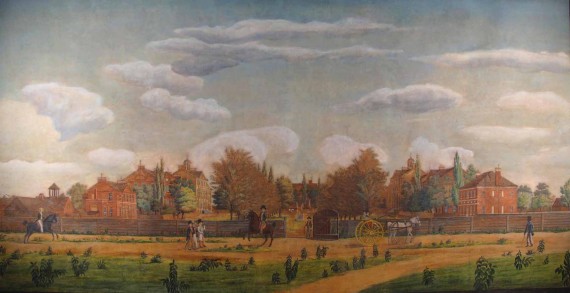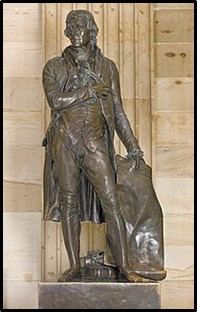The late Richard M. Weaver, “now widely recognized as one of the most original and perceptive interpreters of Southern culture and letters, one of the century’s leading rhetorical theorists, and a founder of American conservatism,” crafted many essays still relevant today. He wrote prolifically until his death in 1963. The quote above came from the introduction of a large volume of his works by the editor, Ted J. Smith III (no relation). It is titled, “In Defense of Tradition” and includes his “shorter writings.”
Dr. Weaver taught English and rhetoric courses at the University of Chicago during much of his short career. But he grew up in North Carolina, was schooled in Southern States and maintained a family home in Weaverville, N. C. where he supported his widowed mother and other family members.
Weaver wrote an essay titled, “The Regime of the South,” published in National Review in 1959. That year I graduated college in New York State. I don’t remember reading Weaver in my English courses at Syracuse University, but it’s not surprising. Only fifty years later did I discover Southern nonfiction literature, previously obscure to me, after moving to North Carolina—but not at the university where I earned 21 credit hours in English courses. I do remember, as Weaver wrote then, the national controversy “raging over segregated schooling.” Hatred of Southern “ways” dominated our information.
In the essay Weaver suggested that the oft heard phrase “the Southern way of life” was used with little understanding. Missing in the rage, he pointed out, is that way of life is a normal social phenomenon and translates from the old term regime.
Weaver also noted that social scientists used an interesting word appropriate to his thesis: anomie; “a condition of society in which the guidelines of belief and behavior have largely disappeared…where frustration and chaos reach dangerous levels.” In short, anomie means disintegration.
I’m struck by the irony and foresight of Weaver’s thinking. In 1959 Northern liberals were obsessed with racial integration—that federal forcing of social structure turned out to be untenable. Now our disunified society shows signs of disintegrating. Evidence of it runs in the news almost daily: ranging from frequent criminal shootings by black youth in inner cities to the recent rage and hate from liberal factions over the simple meaning and application of religious freedom.
There is great understanding in Weaver’s essays about Southern history and culture, at least as it was once. I don’t agree, however, with his use of the word regime. That noun has become too closely associated with government and planned systems. Systems of government authority, control and planning are antithesis to freely and openly functioning societies. Weaver recognized that a regime is much more than government and laws; it includes “beliefs, traditions, customs, habits, and observances.” Still, I think there is a better, less regimented-sounding word: arrangement partnership, association, or how about confederacy?
Further, I wouldn’t use the word anomie for our disappearing standards and values, and the disintegration of our society. Disunion is appropriate and better understood; its antonym is federation.
Prior to the 1860s our States worked in peaceful, although sometimes contentious, commerce through a voluntary federation. That ended abruptly in 1861. Since then, we, the people, have become increasingly disunified. We are splitting up because of vicious factional demands for new “rights” and “equality” receiving inordinate attention and resources; and an increasingly totalitarian central government, in my opinion. Representatives of the original States continually warned of these future threats.
Back to Weaver’s essay: where he uses the words regime and anomie, I’ll use confederacy (or arrangement, partnership, association) and disunion.
He compares a (confederacy) to “the rule of a household.” There is a place for everybody, but it cannot be the same for all. The social whole has locations and directions. A (confederacy) “is a powerful check against the sense of lostness, the restlessness, and the aimless competition which plague the modern masses and provoke the fantastic social eruptions of our era.”
Weaver believed it’s an “antidote” to our modern life complaints. It’s what normal people look for: to not depend on government, “but upon the voluntary preferences of many individuals, acting and interacting out of respect for some basic values.”
Confederation (regime) is also exclusive. It is a way of rejecting what’s foreign to the group’s nature—intolerance of what would be fatal to survival. Weaver said that “Liberalism is the death-wish of modern civilization.” Liberal associations are incapable of commitment, nihilistic, and have almost pathological fear of settled principle. “Liberalism operates to destroy everything and conserve nothing,” he wrote. It can’t “postulate anything positive.” Liberals are bitter toward any independent and healthy growth, which reminds them of their own hollowness.
Dr. Weaver briefly discussed other American confederations such as New England (prior to 1861 some of those States proposed to secede from the Union), the “Old West,” and “the American way of life.” He noted that the (confederacy) of the South was “under heavy assault by Liberalism,” and gave reasons why Liberals hate it.
The South has maintained a (confederacy) “in the clearest and most enduring form.” “It has a society more unified by imponderables, more conscious of self-definition, more homogenous in outlook than any other.” To Weaver, three things explained its persistence: It had a structured society; receptivity to the idea of transcendence; and it preserved its history. Detractors refer to these things as “aristocratic,” “Bible Beltism,” and “living in the past.”
Yet, wrote Weaver, these Southern characteristics were strong barriers to disunion. A stable, structured association gives a feeling of permanence; transcendence persuades people that they live for something more than things of the moment; and preservation of history “keeps tradition from seeming arbitrary, endowing it not only with reason but with grace.”







